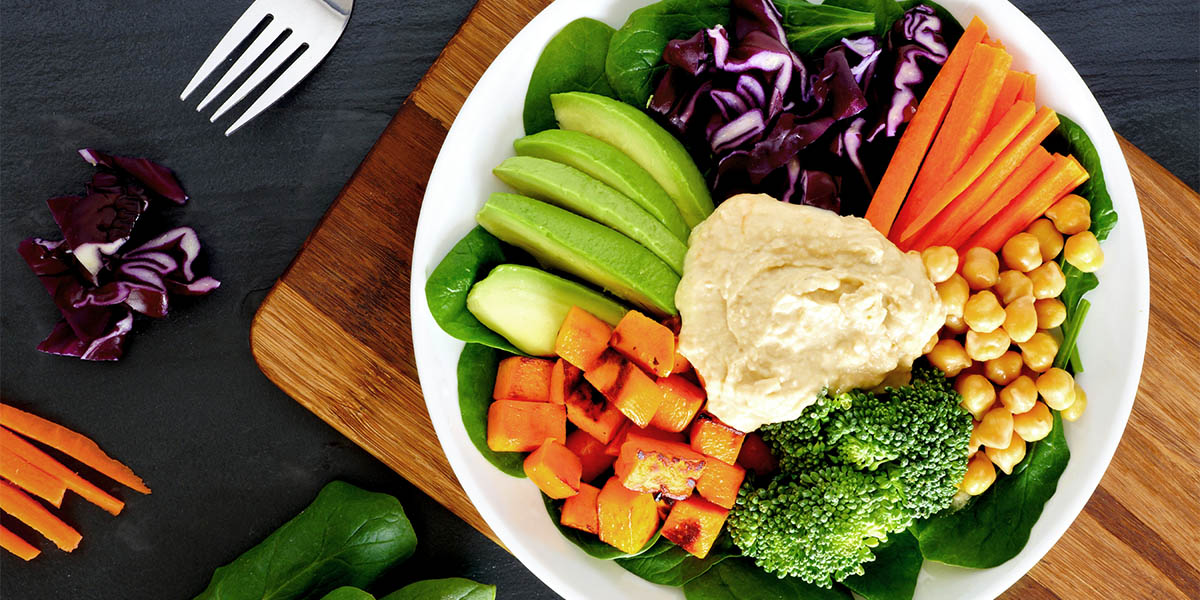Plant Based Chicken Meal Prep Ideas for Busy Professionals
All About Healthy And Balanced Food: Advantages of Checking Out Plant Based Alternatives
The conversation surrounding plant-based diets has gained significant interest recently. Numerous people are checking out the possible wellness advantages, nutritional advantages, and environmental effects connected with these dietary choices. As individuals become more familiar with their food's impact on wellness and sustainability, questions occur about the usefulness of embracing such a way of living. What certain modifications can one expect, and just how might these selections improve not only individual wellness yet also the earth's future?
Comprehending Plant-Based Diets
Although lots of people connect plant-based diet regimens generally with vegetarianism or veganism, these diet regimens can incorporate a vast array of eating patterns that prioritize whole, minimally refined plant foods. Such diet regimens commonly include fruits, veggies, whole grains, seeds, nuts, and vegetables, while removing or limiting pet products. This versatility permits individuals to customize their dietary selections according to nutritional requirements and individual choices. Some may embrace a largely plant-based diet while still periodically consuming meat or dairy products, often referred to as a flexitarian strategy. The focus stays on including even more plant foods, which can result in a varied array of dishes and tastes. Recognizing these various analyses of plant-based consuming is essential for appreciating its accessibility and appeal in contemporary food culture.
Wellness Advantages of Plant-Based Foods
The wellness advantages of plant-based foods are significant, providing a nutrient density advantage that supports general wellness. Research suggests that these foods can enhance heart health and wellness and play an essential function in reliable weight monitoring. By including more plant-based options, people may improve their nutritional choices and promote long-lasting health and wellness.
Nutrient Thickness Advantage
Nutrient thickness plays an essential role in the wellness advantages of plant-based foods, making them a compelling option for those seeking a balanced diet regimen. Plant-based foods, such as fruits, vegetables, legumes, nuts, and entire grains, are often abundant in essential vitamins, minerals, and antioxidants while being reduced in calories. This high nutrient thickness permits people to take in fewer calories while still meeting their dietary needs. Furthermore, these foods are loaded with dietary fiber, advertising digestion health and wellness and aiding in weight management. By incorporating nutrient-dense plant-based options, customers can improve their overall wellness, sustain their body immune systems, and minimize the risk of persistent conditions. Ultimately, the nutrient thickness of plant-based foods emphasizes their significance in a health-conscious way of living.
Heart Wellness Enhancement

Weight Administration Assistance
In addition to promoting heart health, a plant-based diet plan can substantially aid in weight monitoring. This nutritional technique stresses whole foods such as fruits, vegetables, legumes, nuts, and whole grains, which are typically lower in calories and greater in fiber compared to animal-based products. The high fiber material assists enhance satiation, decreasing general calorie intake. In addition, plant-based diets are often abundant in check this site out crucial nutrients while reduced in unhealthy fats, making it much easier to maintain a healthy weight. Sugar Free Sauces. Research shows that individuals who embrace a plant-based way of living often tend to have lower body mass indexes (BMIs) and experience more successful fat burning compared to those that consume meat-heavy diet plans. As a result, embracing plant-based options is a tactical choice for reliable weight management
Nutritional Worth of Plant-Based Active Ingredients
Plant-based components are abundant in vital nutrients, providing a varied variety of vitamins, minerals, and antioxidants that add to total health and wellness. A comparison of protein resources discloses that while pet products are frequently deemed remarkable, lots of plant-based choices offer sufficient protein and various other valuable compounds. Comprehending the dietary worth of these ingredients can aid people make notified nutritional choices.
Important Nutrients in Plants
Nutrient-rich ingredients located in plants provide a varied variety of necessary nutrients that add significantly to general wellness. These active ingredients are rich in vitamins A, C, and K, which sustain immune function, vision, and blood clot, specifically. In addition, plants provide essential minerals such as potassium, calcium, and magnesium, crucial for heart wellness, muscle feature, and bone stamina. The visibility of fiber in plant-based foods aids food digestion and promotes a healthy and balanced gut microbiome. Anti-oxidants, found generously in vegetables and fruits, help fight oxidative anxiety and lower inflammation. Several plant foods are low in calories yet high in nutrients, making them an exceptional option for those seeking to preserve a healthy and balanced weight while making sure excellent nutrient consumption.

Contrasting Protein Resources
Healthy protein sources vary considerably in their dietary profiles, with plant-based ingredients using unique benefits. Unlike pet healthy proteins, which commonly contain hydrogenated fats and cholesterol, plant proteins tend to be reduced in these undesirable elements. Legumes, nuts, seeds, and whole grains are rich in essential amino acids, fiber, vitamins, and minerals. For example, lentils provide high protein content together with considerable iron and folate, while quinoa is a full healthy protein, supplying all nine necessary amino acids. Furthermore, plant-based healthy proteins are often come with by antioxidants and phytochemicals that support overall wellness. The change to plant-based healthy protein resources not just improves nutritional intake yet additionally lines up with sustainable nutritional methods, decreasing ecological effect and promoting long-lasting health and wellness benefits.
Ecological Effect of Plant-Based Eating
As recognition of climate adjustment expands, several individuals are discovering lasting nutritional choices that can substantially reduce their ecological impact. Plant-based eating has become a substantial factor to lowering greenhouse gas discharges, which are primarily related to livestock production. The growing of fruits, beans, vegetables, and grains usually needs less Source resources, such as water and land, compared to pet farming. Additionally, plant-based diet plans can cause reduced logging, as much less land is needed for grazing animals or growing animal feed. By moving towards plant-based choices, customers can sustain biodiversity and advertise much healthier ecological communities. Generally, embracing plant-based eating not just advantages personal wellness but also stands for an essential action toward environmental sustainability and conservation initiatives.
Overcoming Common Misconceptions
While lots of people acknowledge the advantages of a plant-based diet plan, a number of misconceptions typically hinder them from totally welcoming this way of life. An usual idea is that plant-based diet regimens do not have enough protein; nonetheless, many plant sources, such as beans, nuts, and tofu, provide ample protein. Additionally, some think that this diet plan is pricey, when in fact, staples like beans, rice, and seasonal vegetables can be quite cost effective. One more mistaken belief is that plant-based consuming is overly restrictive, whereas it actually supplies a varied variety of foods and flavors. Numerous fret that a plant-based diet regimen might lead to shortages, yet with proper preparation, people can obtain all necessary nutrients, including vitamins and minerals, while enjoying a wide variety of delicious meals. Broad Tips for Transitioning to a Plant-Based Way of life
Making the shift to a plant-based way of life can be an improving experience, though it usually calls for some support to browse the preliminary modifications. Individuals are encouraged to begin progressively, including even more fruits, veggies, vegetables, and whole grains into their meals while decreasing meat and dairy products consumption. Meal preparation is essential; preparing a regular food selection can aid reduce the change and protect against final unhealthy options. Checking out brand-new recipes and cooking approaches can likewise keep and enhance the experience enjoyment about plant-based eating. Additionally, joining support system or areas can provide motivation and share beneficial tips. Remaining informed concerning nutrition assurances well balanced meals, protecting against deficiencies while cultivating a healthy and balanced, satisfying plant-based lifestyle.

Delicious Plant-Based Meal Concepts
Discovering tasty plant-based dish concepts can motivate people to welcome an extra nourishing diet plan. One prominent option is a hearty quinoa salad, including cherry tomatoes, cucumber, and a spicy lemon-tahini clothing. Another favorite is a savory lentil stew, packed with carrots, celery, and aromatic natural herbs, excellent for a soothing supper. For morning meal, over night oats made with almond milk, chia seeds, and topped with fresh berries provide a nutritious beginning to the day. Furthermore, a vibrant vegetable stir-fry with tofu and a selection of vivid veggies can be a quick yet satisfying meal. Luscious avocado salute on whole-grain bread, sprinkled with flavors and seeds, provides a basic yet delicious treat. These meals showcase the variety and splendor of plant-based consuming.

Frequently Asked Questions
Can a Plant-Based Diet Regimen Supply Enough Healthy Protein?
The concern of whether a plant-based diet can supply adequate protein is common. Various sources, consisting of legumes, nuts, seeds, and entire grains, can satisfy protein requires efficiently, supporting a well balanced and nutritious diet for people.
Are Plant-Based Diet Plans Ideal for Children?
The viability of plant-based diet plans for children depends upon mindful planning. Ample nutrients have to be guaranteed, consisting of vitamins, minerals, and proteins. With correct assistance, such diet regimens can sustain healthy growth and advancement in youngsters.
How Do I Eat Out on a Plant-Based Diet plan?
Eating in restaurants on a plant-based diet plan entails seeking restaurants with varied menus, requesting alterations, and exploring vegan-friendly choices. Preparation ahead and interacting nutritional choices can enhance the dining experience while keeping nutritional choices.
What Are Typical Irritants in Plant-Based Foods?
Usual allergens in plant-based foods consist of soy, gluten, nuts, and seeds - Plant Based Chicken. Individuals following a plant-based diet regimen should recognize these irritants and read labels carefully to prevent negative Full Article reactions and assure risk-free consumption
Can Plant-Based Diets Assist With Weight Management?
Research shows that adopting a plant-based diet may assist in fat burning as a result of its usually reduced calorie density and higher fiber content. This mix can improve satiety, aiding people handle their calorie consumption efficiently. Many individuals link plant-based diets generally with vegetarianism or veganism, these diet regimens can incorporate a vast range of eating patterns that prioritize whole, minimally processed plant foods. Nutrient density plays a necessary role in the wellness advantages of plant-based foods, making them a compelling option for those seeking a balanced diet regimen. Plant-based diet plans have been shown to markedly improve heart health, as they often consist of components that sustain cardiovascular feature. In addition to advertising heart health, a plant-based diet can substantially help in weight monitoring. A typical idea is that plant-based diets lack adequate protein; nevertheless, various plant sources, such as legumes, nuts, and tofu, give adequate healthy protein.